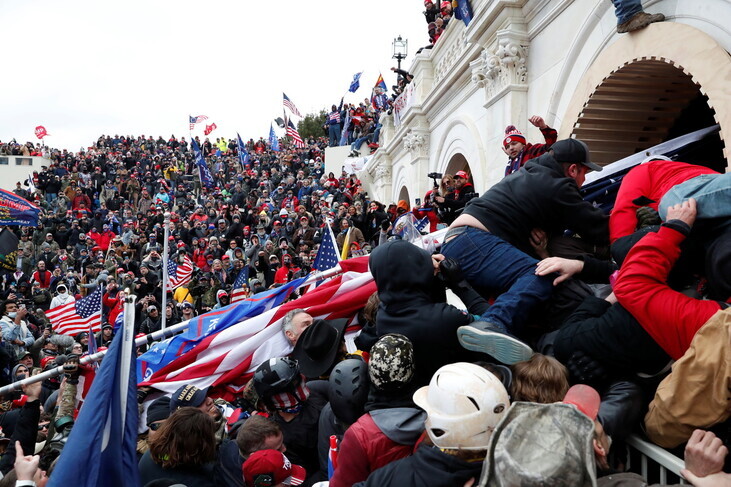With the End of Operation Guardian of the Walls, We Must Turn Our Attention to the Biden Administration
The most important result of Operation Guardian of the Walls is the rehabilitation of deterrence — not only deterrence of Hamas and Hezbollah, but also partially deterrence of their Iranian patron. The prime minister, the minister of defense and the chief of staff had their say, but there are details that have not yet been found out and may never be known. The Israeli Defense Force functioned efficiently, powerfully and with originality, not only with the terrorist groups but also toward Iran. It is clear that there were also mistakes, as in any war, but they did not affect the outcome.
But as important as the immediate results were, we must look beyond the strategic and political consequences to the long-term picture, and we must be clear — not only with Hamas and Islamic Jihad but also with ourselves and our American friends — that unlike what has occurred in the past, all the fighting in Israel, including the incendiary balloons and the rockets, etc. will be answered with massive force. The option of occupying Gaza, despite all of its drawbacks, is not off the table.
It is worth noting the role of the Home Front Command, whose representatives inspired feelings of faith and stability in the public. And while on the subject of the Home Front you have to commend the emotional strength and maturity of the Israeli citizenry, first and foremost the residents of the south of course, who belied the typical talk about rifts in Israeli society.
The public relations efforts were less successful: It’s true that the Foreign Ministry, under the leadership of Gadi Ashkenazi, operated efficiently and successfully, but as in the past, there were some gaps between the planning and transmission of central messaging. For example, the world was horrified by the number of casualties in Gaza, but it did not hear a word about the fact that 80% of the casualties were members of Hamas and Islamic Jihad.
Hamas was also able to create an artificial impression that it was fighting against Israeli provocation and not as a deliberate strategic process for promoting its own position among the Arabs of Eretz Yisrael on both sides of the green line.
Also, the pro-Palestinian demonstrations missed their mark and even boomeranged as, thanks to a diplomatic base in the hands of the prime minister and the continuous work of the Foreign Ministry, Israel had the upper hand. In the past, we have not seen flags of Israel flying in the government offices and party headquarters of different European countries. Our partnering relationships with the Abraham Accords also provided some balance.
Of special importance is the difference between the relationship with the Barack Obama administration and the Joe Biden administration. Those politicians and certain journalists who never get tired of warning us about the problematic relationship between Biden and Prime Minister Benjamin Netanyahu were disappointed.
Indeed, the pressure for an early cease-fire worked against Israel, but as opposed to Obama in his time, Biden blocked a negative decision against Israel raised at the initiative of “our French friends” in the U.N. Security Council. And on his home territory, Biden continues to deflect the anti-Israel initiatives of the far left of the Democratic Party, including on the issue of security aid.
But we are not protected forever, and it’s not only that the progressive pressure in Congress will continue to constitute a problem for Biden. The basic American policy on the Israeli-Palestinian issue, with the exception of the Donald Trump era, has not changed: Israeli withdrawal from the territories, opposition to building over the green line and a two-state solution.
Until recently, the Biden administration preferred, as opposed to Obama and other presidents who preceded him, to leave these issues aside — because of the failure of Obama and Secretary of State John Kerry, but especially because he decided to put most of the U.S.’ strategic effort into relations with China, and because of the general feeling that the U.S. is no longer an essential player in the Middle East. But it’s possible that this hesitation has ended now, and from the point of view of Israel, America remains, and will continue to be, an essential factor.
Actually, because there are issues on which there have been and will always be differences of opinion between us — such as the required assumption (from our point of view) that given the attempt of Hamas to gain control over the greater Palestinian area, the establishment of a Palestinian state has to be taken off the agenda for now — we will have to work hard to keep these controversies from damaging the basic web of our essential relationship with America.
From this standpoint, it was encouraging to hear Biden say, “Until the region says unequivocally they acknowledge the right of Israel to exist as an independent Jewish state, there will be no peace.”
This has always been Israel's demand and always will be.

/cloudfront-us-east-1.images.arcpublishing.com/tgam/ZG74EV6JB5EUXD7HHBTURCTYEM.jpg)
